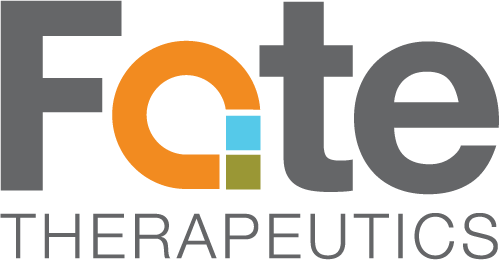Option-based Collaboration to Develop Two CAR T-Cell Product Candidates Using Fate’s Proprietary iPSC Product Platform
SAN DIEGO, Sept. 17, 2018 — Fate Therapeutics, Inc. (NASDAQ:FATE), a clinical-stage biopharmaceutical company dedicated to the development of programmed cellular immunotherapies for cancer and immune disorders, announced today that it has entered into a collaboration with ONO Pharmaceutical Co., Ltd. for the joint development and commercialization of two off-the-shelf CAR-T cell product candidates. Using Fate Therapeutics’ proprietary induced pluripotent stem cell (iPSC) product platform, the two CAR T-cell collaboration candidates will each be derived from a clonal master iPSC line engineered to completely eliminate endogenous TCR expression, insert a chimeric antigen receptor (CAR) into the TRAC locus and incorporate other anti-tumor functionality.
This transformative approach enables the cost-effective production of cell-based cancer immunotherapies that are uniformly engineered, extensively characterized and homogeneous in composition, and can be consistently and repeatedly mass produced and delivered to patients in an off-the-shelf manner.
“We are delighted to collaborate with ONO, a global leader in oncology with a long history of developing innovative breakthrough cancer drugs,” said Scott Wolchko, President and Chief Executive Officer of Fate Therapeutics. “This partnership with ONO enables Fate to further enhance its expertise in targeting solid tumors and to accelerate the global development of our pipeline of off-the-shelf, iPSC-derived CAR-T cell product candidates.”
Under the terms of the strategic option agreement, Fate Therapeutics and ONO will jointly advance each iPSC-derived CAR-T cell collaboration candidate to a pre-defined preclinical milestone. The first iPSC-derived CAR T-cell candidate targets an antigen expressed on certain lymphoblastic leukemias, and Fate Therapeutics retains global responsibility for development and commercialization with ONO having an option to assume responsibilities in Asia. The second candidate targets a novel antigen identified by ONO expressed on certain solid tumors, with ONO having an option to assume global responsibility for further development and commercialization and Fate Therapeutics retaining the right to co-develop and co-commercialize the candidate in the United States and Europe. For both collaboration candidates, Fate Therapeutics retains manufacturing responsibilities on a global basis.
“ONO identified Fate Therapeutics as the partner of choice for the generation of off-the-shelf CAR T-cell cancer immunotherapies in our portfolio,” said Hiromu Habashita, Corporate Officer, and Executive Director of Discovery & Research of ONO. “We are excited to work with Fate Therapeutics and apply its industry-leading iPSC product platform to develop and deliver the next-generation of CAR T-cell therapies for cancer patients.”
Fate Therapeutics will receive an upfront payment and committed research funding during the preclinical option period, and is eligible to receive a preclinical option exercise fee, clinical, regulatory and commercialization milestone payments and tiered royalties on net sales by ONO in connection with the development and commercialization of each collaboration product by ONO in the ONO territory.
About Fate Therapeutics’ iPSC Product Platform
The Company’s proprietary iPSC product platform enables mass production of off-the-shelf, engineered, homogeneous cell products that can be administered in repeat doses to mediate more effective pharmacologic activity, including in combination with cycles of other cancer treatments. Human iPSCs possess the unique dual properties of unlimited self-renewal and differentiation potential into all cell types of the body. The Company’s first-of-kind approach involves engineering human iPSCs in a one-time genetic modification event, and selecting a single iPSC for maintenance as a clonal master iPSC line. Analogous to master cell lines used to manufacture biopharmaceutical drug products such as monoclonal antibodies, clonal master iPSC lines are a renewable source for manufacturing cell therapy products which are well-defined and uniform in composition, can be reproducibly produced at significant scale in a cost-effective manner, and can be delivered off-the-shelf to treat many patients. Fate Therapeutics’ iPSC product platform is supported by an intellectual property portfolio of over 100 issued patents and 100 pending patent applications.
About Fate Therapeutics, Inc.
Fate Therapeutics is a clinical-stage biopharmaceutical company dedicated to the development of first-in-class cellular immunotherapies for cancer and immune disorders. The Company is pioneering the development of off-the-shelf cell therapies using its proprietary induced pluripotent stem cell (iPSC) product platform. The Company’s immuno-oncology pipeline is comprised of FATE-NK100, a donor-derived natural killer (NK) cell cancer immunotherapy that is currently being evaluated in three Phase 1 clinical trials, as well as iPSC-derived NK cell and T-cell immunotherapies, with a focus on developing augmented cell products intended to synergize with checkpoint inhibitor and monoclonal antibody therapies and to target tumor-specific antigens. The Company’s immuno-regulatory pipeline includes ProTmune™, a next-generation donor cell graft that is currently being evaluated in a Phase 2 clinical trial for the prevention of graft-versus-host disease, and a myeloid-derived suppressor cell immunotherapy for promoting immune tolerance in patients with immune disorders. Fate Therapeutics is headquartered in San Diego, CA. For more information, please visit www.fatetherapeutics.com.
Do you have questions about this CAR-T collaboration? Ask them in the comments below.
Interested to know every market competitor involved with CAR-T? Get instant access with the “Global Database of CAR-T Cell Therapy Companies (2018).”
